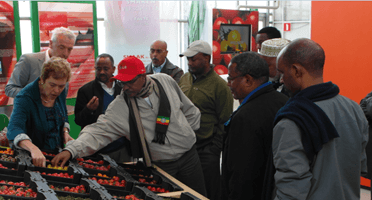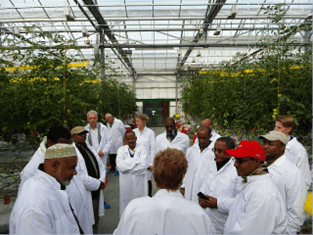The agricultural team at the Netherlands Embassy in Ethiopia has been collaborating with Agriterra to organize a mission to the Netherlands from October 20–27, 2024. This article provides information on the significance, participants and expected outcome of the mission. In addition, it details the current context of the Ethiopian Agricultural cooperatives and the factors that motivated the mission. It also provides a brief outline of previous visits organized by Agriterra, including a video that explains a recent visit to the Netherlands.
Mission context
Agriterra, a Dutch agri-agency established in 1997, supports farmer organizations and cooperatives in developing countries. It strengthens agricultural practices, enhances cooperative governance, and improves market access for smallholder farmers. By leveraging Dutch expertise, Agriterra boosts productivity, facilitates access to finance, and promotes sustainable development. It also helps transfer knowledge to cooperatives and other actors, encouraging experience sharing and the adoption of best practices to drive continuous improvement.
As part of their commitment to knowledge sharing and capacity building to support agricultural development, the Agriterra team has been facilitating study tours to the Netherlands for Ethiopian cooperatives leaders and government officials since 2014. Three such tours were organized in 2014, 2019, and 2023. Participants have included high-level government officials, such as regional agricultural bureau heads, representatives from the Ministry of Agriculture, and the Ethiopian Cooperative Commission (formerly the Federal Cooperative Promotion Agency), as well as cooperative members. These study tours have led to several significant outcomes.
Significant outcomes from previous missions
- 2016 Amendment to the Ethiopian Cooperative Proclamation: internal capital mobilization as a key financial resource mobilization for cooperatives in Ethiopia's and the formation of a Cooperative League/Apex Body have been included in the new proclamation. These two ideas were drawn from the experience of Dutch cooperatives.
- Inclusion of External Experts/Professionals in Cooperative Boards: The concept of involving external professionals in the boards cooperative unions was adopted from Dutch cooperatives. This approach is now being piloted in selected bigger cooperative unions in the Oromia and Amhara regions.
- Cooperative Mergers: Inspired by Dutch practices, the Ethiopian Cooperative Commission (ECC) is actively promoting cooperative mergers across all regions to create stronger and more viable cooperatives for farmers.
- Accelerating Dire Union Lobby and Advocacy Efforts: In 2023, a study tour to the Netherlands involving ECC, Dire Dawa City Administration Officials, and Dire Union representatives proved the study was highly impactful. The tour redefined Dire Union's strategic initiatives, particularly in their five-year advocacy and lobbying efforts to acquire a government-owned chicken farm. The study tour showcased the effectiveness of cooperatives in the Netherlands, and motivated senior officials in the Dire Administration. As a result, they donated a long-idle government chicken farm valued at ETB 85.76 million. With Agriterra's support in the lobbying process, the farm is now operational and benefiting local farmers. In this YouTube video you can hear more about the 2023 study tour in the Netherlands

A new study tour in 2024
Inspired by the results of the past study tours, the Cooperative Bank of Oromia is funding a corresponding study tour that is scheduled for October 20–27, 2024. Fifteen people will join the tour, including the Commissioner of the Addis Ababa Cooperative Commission, the Deputy Commissioner of the Ethiopian Cooperative Commission, the Head of the Oromia Cooperative Promotion Agency (OCPA), the Head of the Oromia Agricultural Bureau, the Head of the Oromia Rural Development Coordination Office (CBO), General Manager and Board Chairperson (farmer), the Oromia Agricultural Cooperative Federation (OACF) and two participants from Agriterra.
Sharing best practices and strengthening relationships
The main objective of this study tour is to learn from the best practices and experiences of Dutch cooperatives, particularly in areas such as market linkage facilitation, improving trade between the Netherlands and Ethiopia, and accessing finance. The tour will also focus on understanding the role of Apex cooperatives in supporting the sector through lobbying and advocacy, with the ultimate goal of enhancing cooperative development in Ethiopia and influencing policymakers. Furthermore, the tour aims to demonstrate to policymakers the value of establishing strategic relationships between the two countries for mutual agricultural benefits.
It also seeks to strengthen the relationships of the Oromia Coffee Farmers’ Cooperative Union (OCFCU), the Oromia Agricultural Cooperative Federation (OACF), and the Cooperative Bank of Oromia (CBO) by facilitating visits and experience-sharing with coffee off-takers, fertilizer producers, and Rabobank. Finally, this initiative is also designed to influence cooperative development in Ethiopia through strategic policymaker engagement and to build strong institutional ties between Rabobank and the Cooperative Bank of Oromia (CBO), thereby benefiting cooperative financing and development.
The Ethiopian Cooperative Commission (ECC) is currently implementing a comprehensive cooperative reform program at both regional and national levels. The government's goal is to elevate cooperatives into robust, viable organizations that significantly contribute to the livelihoods of farmers and overall national development. By facilitating stronger linkages between rural and urban areas through raw material supply, the ECC aims to transform cooperatives into key drivers of economic growth. Key reform agenda include cooperative mergers, the establishment of cooperative league, and the enhancement of governance structures through the inclusion of external experts. Additionally, the ECC is focused on strengthening cooperatives across various domains. The insights garnered from this study tour will be instrumental in accelerating the ECC's reform agenda.
Visiting organizations and companies
To achieve the intended objectives of the study tour, the participants will visit several key organizations in the Netherlands. These include the Dutch Ministry of Foreign Affairs (DGIS), the National Cooperative Council (NCR), and Wageningen University, which are essential for gaining insights into cooperative policy and academic perspectives. Friesland Campina and ZLTO will provide valuable knowledge on dairy and agricultural cooperative models. Additionally, visits to coffee off-takers and roaster companies, as well as fertilizer-producing companies, will enhance understanding of supply chain and input procurement processes. Rabobank and the ACRON Project are crucial for exploring financial partnerships and project implementation strategies. The tour will also include the Royal Flora Holland Cooperative and the Agrico Potato Cooperative to learn about successful horticultural and agricultural cooperative practices.

Expected outcomes
The study tour visit to the Netherlands by higher officials and cooperative management teams is expected to yield several significant outcomes. Firstly, government bodies such as the Ethiopian Cooperative Commission (ECC) and the OCPA will be supported in revising regulations to create a more enabling environment for apex formation and lobbying for cooperative needs, such as fertilizer imports. Additionally, the BOA and the Oromia Rural Development Coordination Office will be encouraged to support cooperatives in importing essential agricultural inputs like agrochemicals and fertilizers. The Addis Ababa Cooperative Commission (AACC) will focus on strengthening urban consumer cooperatives in collaboration with Farmer-Based Organizations.
In the finance sector, CBO will aim to reinforce their partnership with Rabobank and implement the ACRON project, while also raising awareness and providing financing to coffee cooperatives to help them comply with the European Union Deforestation Regulation (EUDR). Lastly, cooperatives such as the OCFCU and the OACF will work towards strengthening their relationships with coffee buyers and sharing experiences with fertilizer producers based in the Netherlands. The study tour will also facilitate the exchange of knowledge on strengthening supervisory boards and collaborating with government partners to streamline the import of necessary agricultural inputs.
More information and contact
For more information about this study tour to the Netherlands or any agricultural and nature domain related questions, you can reach out to the team in Addis Ababa: ADD-LNV@minbuza.nl